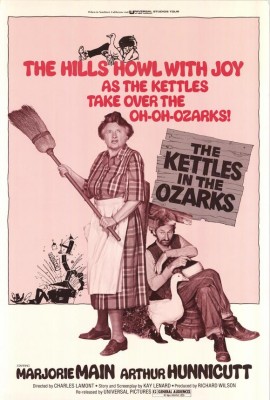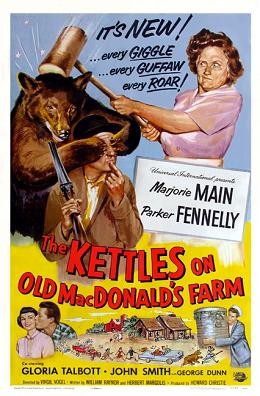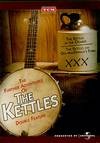| Reviews & Columns |
|
Reviews DVD TV on DVD Blu-ray 4K UHD International DVDs In Theaters Reviews by Studio Video Games Features Collector Series DVDs Easter Egg Database Interviews DVD Talk Radio Feature Articles Columns Anime Talk DVD Savant Horror DVDs The M.O.D. Squad Art House HD Talk Silent DVD
|
DVD Talk Forum |
|
|
| Resources |
|
DVD Price Search Customer Service #'s RCE Info Links |
|
Columns
|
|
|
Further Adventures Of The Kettles (The Kettles in the Ozarks / The Kettles on Old MacDonald's Farm), The
Needless to say, The Kettles in the Ozarks (1956) and The Kettles on Old MacDonald's Farm (1957) aren't exactly great masterpieces of cinema; it's unlikely anyone would confuse either with Marcel Carné's Children of Paradise. Even by the extremely modest comedy standards set by earlier "Ma and Pa Kettle" entries, these last two are pretty dire. And yet, by B-picture, '50s movie series standards, and despite their mechanical, been-there/done-that execution, both generate a few chuckles. Marjorie Main is still fun to watch as gravelly-voice Ma, and the supporting casts offer up a few surprises. The 16:9 enhanced widescreen transfers are decent, and each title comes with a few modest extra features.
Hard as it is to believe, this was actually re-released theatrically in the 1970s, presumably as a children's matinee.
For the uninitiated - And why would you be initiated? - Ma & Pa Kettle (Marjorie Main and Percy Kilbride), along with some other ancillary characters, first appeared in the fairly good screwball comedy The Egg and I (1947), a movie that actually starred Claudette Colbert and Fred MacMurray. Based on Betty MacDonald's popular book, that film is almost identical story-wise to what later became the long-running sitcom Green Acres.
The movie was popular enough that Universal spun-off the Ma and Pa Kettle characters into their own modest film series, which became an unexpected success. (Main gratefully acknowledges this in the trailer for Ma and Pa Kettle on Vacation, directly addressing the camera and thanking fans.) The film series was rather like what later became The Beverly Hillbillies: laid-back, unassuming "kuntry" folk lacking formal education move into an expensive modern home in the "big city." Jed Clampett found bubblin' crude on his property; in the first series entry Pa Kettle wins a tobacco slogan-writing contest. And, like Beverly Hillbillies, much of the humor is based on the Kettles' good-natured naïveté, their unfamiliarity with urban and ruling class culture, and the conflict that arises when they're put in the same room with pretentious rich folk.
Most of the films were directed by Charles Lamont, a comedy veteran dating back to the silent era, who plied his broad slapstick in a variety of Universal '50s films, including several "Francis the Talking Mule" and Abbott & Costello features. Like those pictures, sight gags that were already pretty wheezy when Lamont was directing Buster Keaton back in the 1930s are recycled for the umpteenth time here. On the other hand, what was funny once is usually funny again and again, and many of these tired old routines still work.
As with Columbia's "Blondie" series, the Kettle films are fairly linear, with a lot of referencing to things that happened in earlier entries. For instance and rather surprisingly, the Kettles decide to stay in the high-tech home they win in the first movie, while maintaining their original, dilapidated farm. (Despite appearances and accents, the Kettles lived outside Cape Flattery, in Washington State, not in the Deep South.) The number of Kettle children steadily rises throughout the series. Though Main was 65 by the time she made The Kettles in the Ozarks, the youngest of their 16 kids (played by Richard Eyer, The 7th Voyage of Sinbad's future genie) is supposed to be just six years old. That Ma sure had stamina.
The most distinctive quality about the series was Percy Kilbride's wonderful performances as Pa Kettle, the laziest man in the movies, a character who by comparison made Willie Best's "Sleep 'n' Eat" persona an industrious go-getter. Pa's also a shameless mooch, coasting through life on the good graces of long-suffering friends and family.
Kilbride left the series following Ma and Pa Kettle in Waikiki (1955), supposedly following an automobile vs. pedestrian accident in which he was the latter. (Kilbride died following yet another road accident a decade later; he and an actor friend were struck when Kilbride, by this time senile, wandered out into the middle of Yucca and Cherokee, in central Hollywood.) In The Kettles in the Ozarks, a never-seen Pa stays at home while Ma and 12 of the kids hightail it to the Ozarks to help Pa's brother, Sedgwick "Sedge" Kettle (Arthur Hunnicutt). Bankers are threatening to take possession of his farm. However, this story facet is completely forgotten after the opening scene.
Like his brother, Sedge is a lazy mooch. So lazy, in fact, that he's been engaged to the same woman for 20 years, luckless Bedelia Baines (Una Merkel). Shortly before Ma and the kids' arrival, Sedge rents out his barn and sells his rather pathetic corn crop to a friendly stranger named Dexter (Jim Hayward), actually the front man of a quartet of moonshiners who look more like Chicago gangsters: the 'Professor' (Ted de Corsia), Benny (Sid Tomack), and Joe (Harry Hines) being the others. They're secretly whipping up hard liquor in the barn, at one point discarding mash in the animals' trough. In the film's funniest scene, all the animals lap it up and get dead drunk. (This is accomplished via slow motion while the animal's bodies are manipulated in all directions by unseen wires. A few of the critters may have been doped up as well.) Mostly though, the gangster-moonshiners are as inept as the Beagle Boys.
The film is harmless and stylistically similar to Disney's slapstick comedies of the late-1950s through mid-'60s. There are, for instance, numerous cutaways to Gertie the galoshes-wearing goose, who is particularly amusing when intoxicated. Hunnicutt was a fine character actor specializing in genial backwoodsmen but so obviously written as a replacement for Kilbride that he doesn't get a chance to exhibit his own particular appeal, though his scenes with Merkel are almost sweet.
One expects lanky hillbilly staple (but Milwaukee-born!) Robert Easton in a film like this, but how about Richard Deacon as an American Indian? One Day at a Time's Bonnie Franklin is in there somewhere, presumably as one of the Kettle kids, but I didn't spot her. (*** out of *****)
Notice how the bear plays peek-a-boo with Pa Kettle, obscuring actor Fennelly's face
The Kettles on Old MacDonald's Farm is something of a misnomer. Old MacDonald doesn't appear, and barely five minutes of the picture's 80-minute running time takes place on his farm. For no clear reason - except maybe that all the standing sets had been torn down - the Kettles have quit both the modern home in the city and their Cape Flattery farm for Old MacDonald's place, but there's nary an E-I-E-I-O within earshot and neither the characters nor the iconic song play any role in the story.
Instead, the film is nearly a remake of The Egg and I. Brad Johnson (John Smith) fell in love with Sally Flemming (Gloria Talbott) while the two were in college, but she's a frivolous rich girl and the boss's daughter. In a clever twist, J.P. Flemming (Roy Barcroft) has no objection to Brad wanting to marry Sally - he thinks Sally's not good enough for Brad. J.P. is concerned that his pampered daughter is much too soft to make a good farm wife. Family friends Ma and Pa Kettle (the latter role now essayed by Parker Fennelly) suggest a 30-day trial period, with Sally doing all the cooking, cleaning, and farmyard chores for her potential husband at the old Kettle farm (recreated entirely on a soundstage) while the Kettles act as 24/7 chaperones. When Sally's rich girlfriends send her a washing machine, a dryer, a sewing machine and other appliances to lighten her workload, Brad orders the conveniences returned. No wife of his is going to lie around the house and make him look bad. As you might already have guessed, Gloria Steinem did not write this screenplay.
The first-half of the film is concerned with Sally's trial-by-fire before it veers off in other nonsensical directions, such as bear named Three Toes causing varied mischief, and a lumberman's rodeo. In one scene Ma sings in the shower, causing all the barnyard animals to act crazy (mostly stock shots from The Kettles in the Ozarks). Late in the film a rumor spreads that Ma is pregnant again. (Main, by this time, was 67 years old.)
Sally and Brad dominate the film over Ma and Pa; it's entirely possible Universal-International was considering shifting the focus away from the Kettles with an eye to make Sally and Brand the new central characters. This was, after all, Main's last film appearance and for the first time she really shows her age. (In both films Main is often doubled in long shots.) While a decidedly lesser "Ma and Pa Kettle" movie, at least it's is a great showcase for the uniquely beautiful and talented Gloria Talbott, here going through the same motions Claudette Colbert went through for The Egg and I.
Talbott must have had a real take-the-money-and-run agent. A prolific presence guest-starring on myriad but mostly low-end '50s TV shows (Adventures of Superman, The Life and Legend of Wyatt Earp), Talbott was poised for stardom after two big films in 1955, playing the ingénue in We're No Angels with Humphrey Bogart, and as Jane Wyman's selfish daughter in Douglas Sirk's All That Heaven Allows. Unaccountably within a year she slipped back into poverty row, doing the cheapest of movies like Daughter of Dr. Jekyll and The Cyclops, though she eventually became a cult favorite among classic horror and sci-fi fans prior to her untimely death in 2000.
Smith was less distinctive but maintained a slightly higher profile. Nevertheless, what appeal the film has lies more in Talbott, Main, and the supporting cast. Fennelly, a fine comedian best known for the radio series "Allen's Alley," is okay as Pa but, as with Hunnicutt, the writing offers little opportunity for the actor to make the role his.
The film has a few good moments, such as when Ma wistfully admires the nightgown Pa bought her when they were married 30 years before; she didn't think he didn't have it in him to buy such a beautiful thing. At the lumberman's rodeo there's a funny bit where Three Toes chases Pa straight into the middle of a log race, which Pa wins hands-down. (** 1/2)
Video & Audio
Despite what it says on the box, The Kettles in the Ozarks is presented in 1.85:1 enhanced widescreen while The Kettles on Old MacDonald's Farm is 2.00:1 enhanced widescreen, a ratio I suspect may also have been correct for the former title. In any case, both black and white transfers look quite nice, especially the last film of the series. The Dolby Digital mono is fine on Ozarks but I found the dialogue track on MacDonald's Farm a bit too low and the music/effects track mixed too high, and for the first-half especially I found myself frequently adjusting the volume. No subtitles or alternate audio options but at least it's a real dual-layered DVD, not a DVD-R.
Extra Features
Supplements are modest, limited to a detailed, easy to navigate selection of scene stills, lobbies, publicity stills, and posters. In a smart move, a pressbook is available for standard viewing as a DVD, but also as a separate PDF file
Parting Thoughts
Unless you're a fan of the corniest of cornpone humor, The Further Adventures of the Kettles is likely to appeal exclusively to those wanting to complete their Ma & Pa Kettle series collections. But the series itself is warm and unpretentiously funny, if modestly so, movies to enjoy with the pre-teen kids on a rainy Saturday afternoon. Recommended.
Film historian Stuart Galbraith IV's books include The Toho Studios Story, on sale now.
|
| Popular Reviews |
| Sponsored Links |
|
|
| Sponsored Links |
|
|
| Release List | Reviews | Shop | Newsletter | Forum | DVD Giveaways | Blu-Ray | Advertise |
|
Copyright 2024 DVDTalk.com All Rights Reserved. Legal Info, Privacy Policy, Terms of Use,
Manage Preferences,
Your Privacy Choices | |||||||















